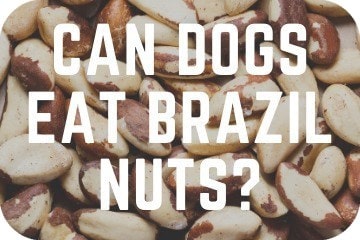
Can dogs eat Brazil nuts? Not really, but they are not thought to be toxic to dogs.
However, they are not the healthiest treat due to the high-fat content, which makes them difficult to digest. They can also cause intestinal blockages.
We don’t recommend feeding them to your dog, but if your dog has happened to steal a small amount, there shouldn’t be any fatal side effects.
If you are concerned, or your dog’s behavior alters after consuming something, contact a veterinarian immediately.
Try feeding your dog fresh vegetables as an alternative to nuts, many vegetables (but not all) can be nutritious for dogs and work as healthy treats in moderation.
Busy? Get Your Hands Paws On The Answers Quickly…
5 BRAZIL NUT FACTS

- The nuts come from the Brazil nut tree.
- The tree is South American and is one of the largest in the Amazon rainforest.
- The edible nut is actually a seed opposed to a nut. However, those with a nut allergy should still avoid them.
- The seed is incased in large, coconut-like, case. Inside are up to 25 triangular seeds, referred to as Brazil nuts.
- They are considered nutritious for human consumption. However, they do pose possible side effects with overconsumption.
WHAT ARE THE RISKS OF EATING BRAZIL NUTS FOR DOGS?

Obesity
Nuts in general, particularly Brazil nuts, contain a large amount of fat. They contain 66g fat per 100g. A dog of around 35lb should only have 14g fat per day, according to The National Academies of Sciences, Engineering, Medicine. So 100g of these nuts is almost five days worth of fat intake, without consuming anything else! (link)
Choking
The shape of Brazil nuts make them a particular choking hazard to dogs. Most dogs do not chew their food; this is due to the shape of their teeth and the fact that their food is digested in the stomach rather than the mouth. (link)
Food like nuts can pose problems as they are too large and hard to be swallowed without chewing. Brazil nuts may get stuck in the throat or intestines, causing an obstruction or choking.
Gastroenteritis
Gastroenteritis can occur for many reasons; symptoms include sickness and diarrhea. One of the most common reasons is food sensitivity, intolerance, or allergy. Eating new food, including Brazil nuts, can cause an upset stomach. Contact your veterinarian for advice. Most vets will suggest a fasting period, followed by plain food. However, this can vary from dog to dog.
Pancreatitis
Most nuts contain lots of fat, particularly Brazil nuts. High-fat diets are commonly blamed for pancreatitis. Pancreatitis is when the pancreas is inflamed and can be incredibly painful for dogs. Symptoms include vomiting, your dog being in obvious pain, lack of appetite, high temperature, and lethargy. (link)
Flavored Nuts
Nuts are commonly covered in sweet, salty, or additional flavorings. Flavorings and additives are not suitable for dogs, and some additional ingredients can even be toxic.
CAN DOGS EAT OTHER NUTS?
Nuts are not the healthiest addition to a dog’s diet. Dogs do not need the same nutrients we do, so a healthy snack for us is not necessarily beneficial for them.
Nuts that have gone moldy or contaminated harbor a higher risk. They contain a toxin aspergillus flavus.
This toxin produces aflatoxin. Aflatoxin is present in many nuts, and although some levels are seemingly safe for humans, they can affect dogs differently.
The USDA does regulate the amount in nuts, but it is still unknown as to whether these could cause long term problems. (link)
Signs of aflatoxin poisoning include loss of appetite, lethargy, liver failure, among others. A vet must be contacted if your dog displays any signs.
Overall, nuts aren’t needed in a dogs’ diet. Many alternatives are better as treats for dogs, and we recommend a small piece of fresh, dog-safe fruit or veg.
Some nuts are considered ok for dogs to eat, others are not recommended, and some are toxic.
Peanuts and Peanut Butter – Occasionally, in small amounts.
Peanuts aren’t actually a nut. They’re a legume. While they’re not thought to be toxic to dogs, they are high in fat and can be difficult to digest. Whole peanuts can also cause an intestinal obstruction.
They also contain a small number of aflatoxins, which can cause liver problems.
If you are going to be feeding your dog peanuts and peanut butter, make sure they have no added ingredients and are fed as a treat, in small amounts, and not too frequently. Contact your veterinarian or nutritionist for further advice.
Cashews – Maybe, but only occasionally, small amounts should be safe.
Again, cashews are considered ok for dogs, but they still contain a lot of fat and can cause pancreatitis. The size also makes them choking hazards. Added ingredients can also be toxic.
Hazelnuts – Maybe, but only occasionally, small amounts should be safe.
Hazelnuts are not thought to be toxic, but they are also not easy to digest and can cause intestinal blockages and choking. As with all nuts, they’re high fat, which can cause obesity and pancreatitis.
Almonds – Not really, but occasionally small amounts should be safe.
Almonds aren’t great for dogs as they’re high fat and can cause gastrointestinal issues. Almonds are also difficult for dogs to digest. They pose a risk of choking. But they’re not that toxic. However, like peanuts, they contain aflatoxins, which can be a problem.
Almond flour cuts down on the risk of choking, but again, only feed it to your dog in small amounts and in moderation.
Walnuts – No.
Like the other nuts, they’re not likely to be toxic but are not a good snack. They’re high in fat and can cause a digestive issue. Their shape and size can also cause intestinal blockages. They also contain aflatoxin, which can be dangerous and high phosphorus levels, which can lead to bladder stones.
Pecans – No.
Along with digestive and gastrointestinal issues of nuts, pecans contain a toxin called juglone, which can be fatal to dogs. There is also a risk of choking or blockages due to their size and shape.
Macadamia Nuts – No.
Macadamia nuts are considered to be highly toxic to dogs. The toxin which affects dogs is not known, and the quantity which affects dogs is also not confirmed.
Signs of poisoning include weakness in the legs, tremors, fever, vomiting, and diarrhea.
If you suspect your dog has ingested a macadamia nut or is displaying any of the above symptoms, contact your veterinarian immediately.
FAQS
What common fruit is poisonous to dogs?
Grapes and raisins are both toxic to dogs and should not be fed. If your dog has eaten either, contact the poison helpline or your vet immediately.
Can dogs have popcorn?
Plain popcorn is considered safe. However, unpopped kernels can cause choking or dental damage. Flavored popcorn may include ingredients toxic to dogs.
Can dogs have strawberries?
Yes, they are a low-calorie fruit that is suitable for dogs.
Can dogs have watermelon?
Yes, but be wary of the rind, skin, and pips.
Can dogs have tomatoes?
Generally, ripe tomatoes are considered safe for dogs. However, they do contain solanine, which can be toxic in large amounts. The majority of the solanine is found in the leaves, stem, and unripe and green tomatoes, but a ripe red tomato should be ok.
Can dogs have bread?
Maybe, most varieties of bread are ok for dogs. Just be sure to check the ingredients list for any potential toxins. However, it is not the healthiest food for dogs, so we don’t recommend it.
Looking for more pawsome posts? Check these out…
How To Make A Snuffle Mat
String Vegetable Game For Dogs
When Do Puppies Lose Their Teeth?
Human Food List For Dogs
Disclaimer: Each dog is different, and every circumstance is different. All efforts have been made to provide accurate information. However, it is not provided by a qualified Veterinarian, Veterinarian Surgeon, or Behaviorist. The information provided is purely educational. The information should not be used as an alternative or substitute for medical care. If you have any health or medical concerns, contact a qualified Veterinary Surgeon or Veterinarian immediately










No Comment! Be the first one.